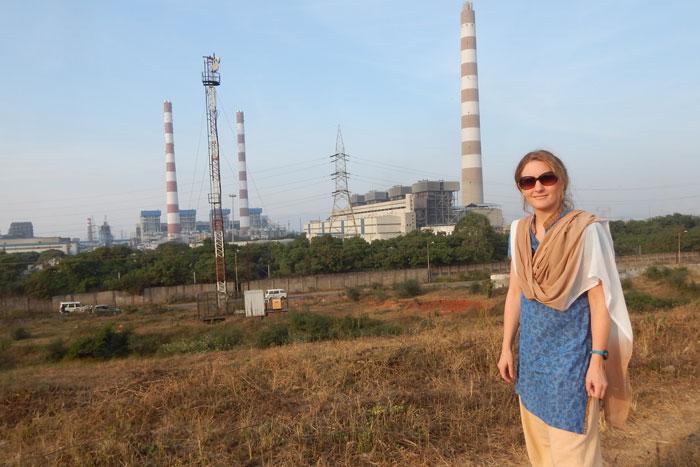Listening for Local Voices

Both India and central Pennsylvania offer fertile ground for a research project recently launched by Assistant Professor of Environmental Studies Heather Bedi, seen here in India. Photo courtesy of Heather Bedi.
Heather Bedi explores how communities experience energy extraction and production, from Pennsylvania to India
Heather Bedi came to Dickinson in the fall of 2014 as an assistant professor of environmental studies, but it wasn’t long before she was on a jet to India for the first leg of a project studying how the energy industry and pollution affect people at the grassroots level.
“The research overall focuses on how environmental change—whether industrialization or mining or agricultural change—is experienced and contested,” Bedi says, adding that while overseas she worked with a Swedish researcher, Indian social-movement leaders and human-rights lawyers. “It’s about how people on the ground are seeing those changes and are resisting them in some way. We're looking at the issue through a range of perspectives.”
With a focus on coal pollution—which adds to India’s already troubling air quality—the project kicked off over winter break with fieldwork in the shadow of a massive series of coal mines and thermal power plants in Korba, Chhattisgarh. For her approach, Bedi decided that people living near the mines and plants were best positioned to monitor the pollution emitted. So in Korba, the researchers are working with local community members to install simple, temporary rooftop devices that measure air quality.
“We're putting the technology in the hands of local people who are affected, to monitor their own air pollution,” says Bedi, explaining that the process is a concrete way to explore how communities live with pollution.
With the project just off the ground, Bedi hopes to see some conclusive results in a year’s time. Meanwhile, the Pennsylvania leg of the project—which will focus on a proposed natural-gas pipeline in the state—will begin this summer.
This leg of the research will focus on areas that have not been directly affected by hydraulic fracturing (or fracking) but might soon be impacted by natural-gas pipelines. She’ll conduct interviews with residents and activists to understand why and how they contest the pipelines and fracking more broadly.
Bedi hopes to gain insight into why people become activists, noting that the research will also enable her to give her students a deeper understanding of how environmental issues are experienced outside the classroom. She adds that the ecosystem issues in Korba and Pennsylvania might be as similar as they are different—and the ability that residents have to address them are equally limited.
“In both countries, energy independence is framed as vital to national security and economic vitality,” she says. “While fundamentally different, there are similar concerns about the lack of local voice and choice regarding energy extraction and transportation processes.”
Learn more
Published March 17, 2015